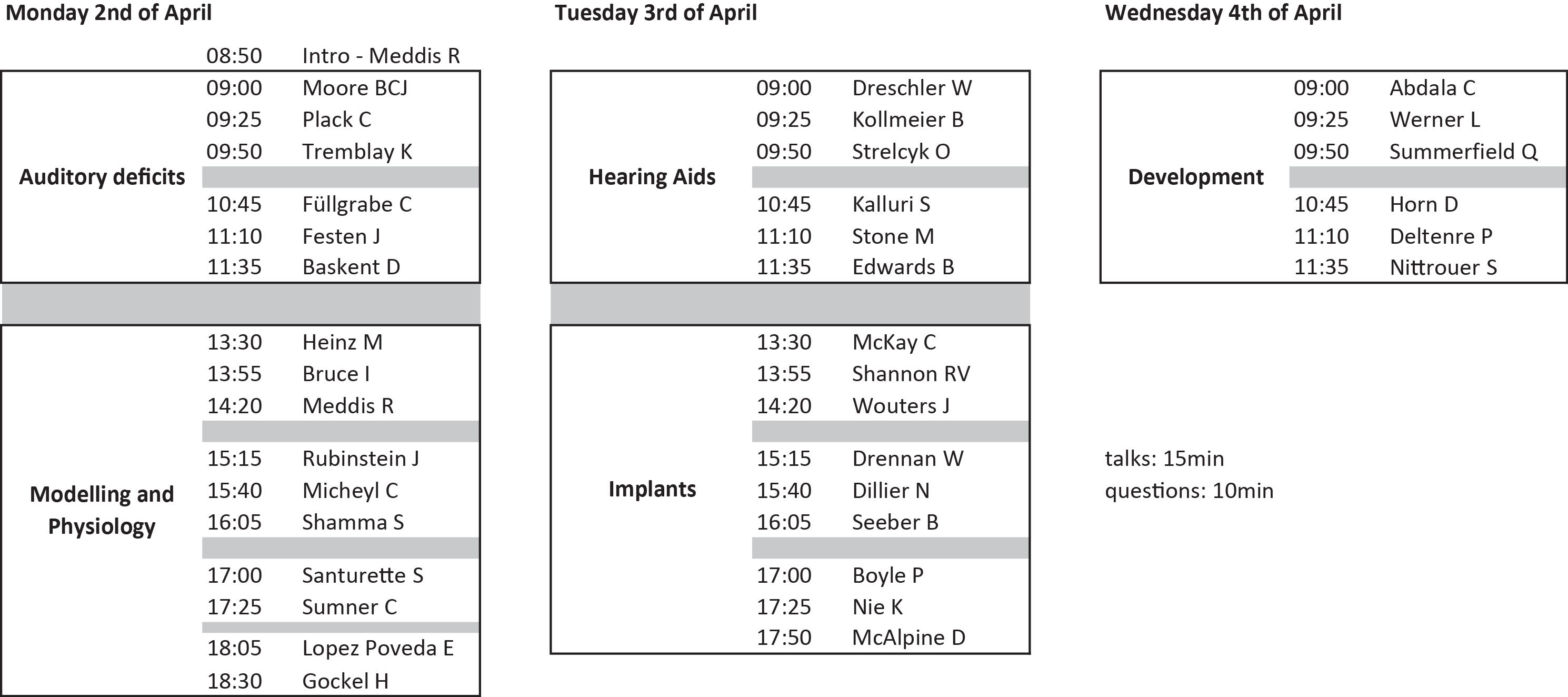Programme summary

Programme details
Monday 2nd
Session I: Auditory deficits
Chaired by: Trevor Agus
| 09:00 - 09:25 | Brian C.J. Moore | "What is temporal fine structure good for?" |
| 09:25 - 09:50 | Chris Plack | "Effects of inner and outer hair cell dysfunction on cochlear gain and compression" |
| 09:50 - 10:15 | Kelly Tremblay | "Hearing aids and brain: what's the connection?" |
| 10:45 - 11:10 | Christian Fullgrabe | "Age-related changes in auditory perception" |
| 11:10 - 11:35 | Joost M. Festen | "Auditory and cognitive processing in speech recognition" |
| 11:35 - 12:00 | Deniz Baskent | "Two ways hearing impairment can interact with cognitive processing" School of Behavioral and Cognitive Neuroscience, University of Groningen, Groningen, The Netherlands. |
Session II: Modelling and Physiology
Chaired by: Marcel Stimberg and Marc Rebillat
| 13:30 - 13:55 | Mike Heinz | "Physiological correlates of perceptual TFS deficits with sensorineural hearing loss" Weldon School of Biomedical Engineering, Purdue University, West Lafayette, USA. |
| 13:55 - 14:20 | Ian C. Bruce | "Modeling changes in auditory nerve fiber excitability for acoustic and electric stimulation" |
| 14:20 - 14:45 | Ray Meddis | "Modelling the efferent contribution to hearing speech in noise" |
| 15:15 - 15:40 | Jay T. Rubinstein | "Biophysical simulation of responses to electrical stimulation" |
| 15:40 - 16:05 | Christophe Micheyl | "Revisiting the place-vs-time debate, from the ground up" |
| 16:05 - 16:30 | Shihab Shamma | "Role of coherence and rapid-plasticity in active perception of complex auditory scenes" |
| 17:00 - 17:25 | Sebastien Santurette | "How essential are place and temporal fine-structure cues for high-frequency complex pitch?" |
| 17:25 - 17:50 | Chris Sumner | "Is mode-locking the new phase-locking? Complex temporal encoding of periodicity in cochlear nucleus" |
| 18:05 - 18:30 | Enrique A. Lopez Poveda | "Quantifying inner and outer hair cell loss in listeners with mild-to-moderate cochlear hearing loss" |
| 18:30 - 18:55 | Hedwig Gockel | "Does the Frequency Following Response (FFR) reflect pitch?" |
Tuesday 3rd
Session III: Hearing Aids
Chaired by: Tim Ives
| 09:00 - 09:25 | Wouter A. Dreshler | "Perceptual effects of noise reduction in hearing aids" |
| 09:25 - 09:50 | Birger Kollmeier | "Models for speech intelligibility in rooms and their consequences for hearing aid processing" |
| 09:50 - 10:15 | Olaf Strelcyk | "Bio-inspired hearing-aid design" |
| 10:45 - 11:10 | Sridhar Kalluri | "Toward a laboratory measure of hearing-aid Outcome in real-world multi-talker environments" |
| 11:10 - 11:35 | Mike Stone | " 'Listening in the dips': the dynamic depth and range achievable by the hearing impaired" |
| 11:35 - 12:00 | Brent Edwards | "How hearing aid technology can affect cognitive function" |
Session IV: Implants
Chaired by: Jonathan Laudanski
| 13:30 - 13:55 | Collette McKay | "Temporal processing in CI, ABI and AMI users" |
| 13:55 - 14:20 | Robert V. Shannon | "New results with auditory brainstem implants" |
| 14:20 - 14:45 | Jan Wouters | "Enhanced temporal coding can lead to improved sound perception in cochlear implants" |
| 15:15 - 15:40 | Ward Drennan | "Perception of frequency-modulation patterns based on recovered-envelope cues for cochlear implant listeners" |
| 15:40 - 16:05 | Norbert Dillier | "Neurophysiologically-based coding strategy for cochlear implants" |
| 16:05 - 16:30 | Bernhard Seeber | "Trading of temporal fine structure and envelope cues leads to robust localization in reverb" |
| 17:00 - 17:25 | Patrick Boyle | "AGC performance revealed by the STAR roving level speech test and the impact of speech rate" |
| 17:25 - 17:50 | Kaibao Nie | "Encoding harmonics to improve speech, music and mandarin tone perception with cochlear implants" |
| 17:50 - 18:15 | David McAlpine | "Making bilateral binaural" |
Wednesday 4th
Session V: Development
Chaired by: Laurianne Cabrera
| 09:00 - 09:25 | Carolina Abdala | "Maturation of human cochlear function" |
| 09:25 - 09:50 | Lynne Werner | "Temporal aspects of infants' attention to sound" |
| 09:50 - 10:15 | Quentin Summerfield | "Spatio-temporal brain activity during multi-talker listening in younger and older adults" |
| 10:45 - 11:10 | David Horn | "Spectral ripple inversion detection - A method to assess spectral resolution in infants" |
| 11:10 - 11:35 | Paul Deltenre | "The Frequency-Following Response: an ancient tool re-sharpened to the benefit of new ideas" |
| 11:50 - 12:15 | Susan Nittrouer | "Developmental changes in perceptual attention and organization for speech: implications for cochlear implant design" |